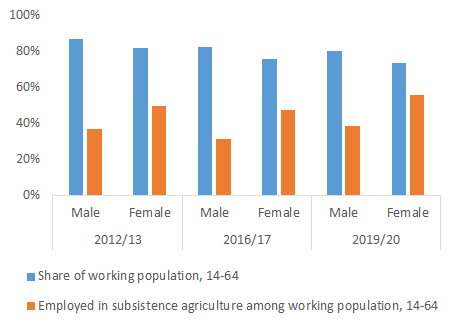 A lady tailor in Kisugu suburb in Kampala district. Photo: Rachel Mabala.
A lady tailor in Kisugu suburb in Kampala district. Photo: Rachel Mabala.
Uganda has an opportunity to build a greener, more sustainable economy by harnessing the skills and talents of women, according to a new report, Gendered Impacts of the COVID-19 Crisis in Uganda and Opportunities for a Sustainable an Inclusive Recovery.
Before the COVID-19 shock, Uganda was already looking toward a future with less reliance on subsistence agriculture and fossil fuels. In its third National Development Plan, the government set the ambitious goal of reducing the share of the population dependent on subsistence agriculture as a main source of livelihood from 69 to 55%.
Transitioning away from heavy reliance on subsistence agriculture is all the more important as the impacts of climate change continue to accumulate. Rising temperatures and decreasing and more volatile rainfall, coupled with increasing frequency of hazard events, have exacerbated vulnerability in an economy heavily dependent on climate-sensitive sectors like agriculture, tourism, and natural resource management. For this reason, Uganda has put in place national policies and strategies to align development goals with international commitments to move away from fossil fuels.
Achieving these goals will require clear pathways for women to move into more sustainable and profitable sectors of the economy. Women’s labor powers much of the Ugandan economy, including the agricultural sector where women make up 73% of workers. Uganda also has some of the highest levels of female entrepreneurship in the world, most of them in agriculture.
Yet women earn about half as much as men, as they tend to work in more volatile and insecure jobs and sectors, and their time is heavily constrained by unpaid care work. Care responsibilities increased with the COVID-19 pandemic, with prolonged school closures and a rise in adolescent pregnancy of at least 17% in the first six months after the March 2020 lockdown alone. Added to this, Uganda has some of the highest rates of gender-based violence in the world, creating a stubborn barrier to women’s economic progress.
The COVID-19 shock poses a setback to the transition out of subsistence agriculture and into more sustainable jobs and sectors, as many Ugandans moved from urban to rural areas with the imposition of lockdown measures in 2020 and 2021. The proportion of women dependent on subsistence agriculture rose from 47% in 2016 to 55% in 2020 — an estimated 60% of all working women in Uganda were working in subsistence agriculture following the first lockdown in March 2020.
Figure 28: Share of working-age population (14-64) working and working solely in subsistence agriculture, by sex and year (%)

Note: Only usual household members are included in 2019/20 and indicators may be slightly different from official UBOS numbers.
As part of its efforts to transform to a greener, more sustainable economy, Uganda is committed to creating pathways for women to shift into better, higher-paying jobs. Gender targets within Uganda’s Green Growth and Development Strategy specify that women will fill 75% of new, “green jobs” in the agricultural sector, and 70% in natural resource management.
The World Bank is supporting the Government of Uganda’s efforts to create pathways for women to shift into more sustainable, higher-profit sectors and jobs through the development of the Generating Growth Opportunities and Productivity of Women Enterprises (GROW) project. Currently under preparation, the GROW project is being designed to support women entrepreneurs in growing their businesses with integrated services.
The report is informing the design of the GROW project and its findings suggest that:
- There is a need in the short-term to continue to support women in their critical roles in the agricultural sector while at the same time investing in the skills and technology for them to move into other higher-earning jobs and sectors.
- Women who move into non-traditional sectors earn profits on par with men, but women require mentoring, information, and capital to make the transition.
- It is also critical to design-in measures to ease women’s unpaid care work, through community childcare and flexible skill-building opportunities.
Finally, reducing emissions and vulnerabilities in the agriculture sector and food systems in Uganda will not happen without women. Empowering women to help achieve a just transition in agriculture also provides an opportunity to promote gender equality.



Join the Conversation